Come join us now, and enjoy playing your beloved music and browse through great scores of every level and styles!
Can’t find the songbook you’re looking for? Please, email us at: sheetmusiclibrarypdf@gmail.com We’d like to help you!
Table of Contents
William Grant Still: Three Visions (Suite for piano solo)
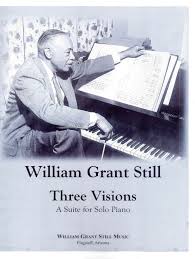
Best Sheet Music download from our Library.
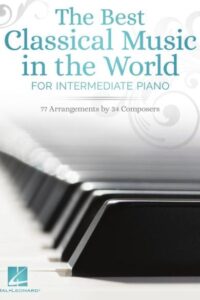
Please, subscribe to our Library.
If you are already a subscriber, please, check our NEW SCORES’ page every month for new sheet music. THANK YOU!
0:00 – Dark Horseman 1:30 – Summerland 6:00 – Radiant pinnacle
Browse in the Library:
Or browse in the categories menus & download the Library Catalog PDF:
William Grant Still
William Grant Still (1895 – 1978) was an American composer, arranger, conductor, and multi-instrumentalist, often called “the Dean of African American composers.” He was the first African American to have a symphony performed by a major orchestra in the United States, the first to conduct a major symphony orchestra, and the first to have an opera produced by a major opera company.

Early Life and Education
- Born on May 11, 1895, in Woodville, Mississippi, and raised in Little Rock, Arkansas.
- His father died when he was an infant, and his mother, a teacher, encouraged his musical interests.
- Studied at Wilberforce University, where he initially pursued medicine but shifted to music.
- Later trained at the Oberlin Conservatory of Music, then studied composition with George Whitefield Chadwick and later with avant-garde composer Edgard Varèse in New York.
Career and Achievements
- Worked as an arranger for popular and jazz bands in New York, including for W. C. Handy and Paul Whiteman.
- Became involved with the Harlem Renaissance, blending African American musical traditions with classical forms.
- His Symphony No. 1 “Afro-American” (1930) was the first symphony by an African American to be performed by a major U.S. orchestra (Rochester Philharmonic, 1931).
- Conducted the Los Angeles Philharmonic at the Hollywood Bowl in 1936, making him the first African American to lead a major orchestra in the U.S.
- His opera Troubled Island (1939, libretto by Langston Hughes and Verna Arvey) was the first by an African American staged by a major company (New York City Opera, 1949).
Musical Style
- Fused classical European traditions with African American idioms: blues, spirituals, jazz, and folk tunes.
- Emphasized lyricism, accessibility, and cultural expression rather than strict modernist abstraction.
- Advocated for a distinctly American classical music rooted in Black cultural traditions.
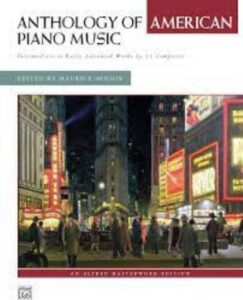
Notable Works
- Symphonies: Afro-American Symphony (No. 1), Song of a New Race (No. 2), The Sunday Symphony (No. 3), Autochthonous Symphony (No. 4), Western Hemisphere Symphony (No. 5).
- Operas: Troubled Island, A Bayou Legend, Highway 1, U.S.A.
- Chamber & Vocal Music: Lyric Quartette, Danzas de Panama, many art songs.
- Also wrote for radio, film, and popular ensembles.
Legacy
- Broke multiple racial barriers in American classical music.
- Opened doors for later generations of African American composers and performers.
- His works are increasingly studied and performed, recognized as cornerstones of 20th-century American music.
- Died in Los Angeles, California, on December 3, 1978.
William Grant Still’s music stands out for celebrating African American heritage within the classical tradition, offering a unique and dignified voice at a time when systemic racism excluded many Black composers from mainstream recognition.
Three Visions (1935) is one of William Grant Still’s most powerful works for solo piano. It is a short suite in three movements, deeply symbolic, written during the Harlem Renaissance period when Still was developing a distinctive African American voice within classical idioms. The suite is often regarded as a spiritual and philosophical statement on the human soul’s journey after death.
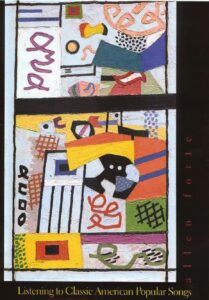
Three Visions (1935) Overview and Musical Analysis
- Title: Three Visions (for solo piano)
- Date: 1935
- Movements:
- Dark Horsemen
- Summerland
- Radiant Pinnacle
- Theme: The cycle represents the progression of the human soul: confrontation with death, passage to spiritual peace, and ultimate ascension.
1. Dark Horsemen
- Character: Turbulent, dissonant, and rhythmically urgent.
- Musical features:
- Rapid ostinati and syncopations drive the texture.
- Dense chords, sharp dynamics, and angular melodies suggest violence and inevitability — the soul’s confrontation with mortality.
- Harmonic language: rooted in tonal centers but heavily chromatic, with influences from early modernism (Still studied with Varèse).
- Strong percussive writing evokes imagery of galloping horses (possibly a reference to the biblical Four Horsemen of the Apocalypse).
Interpretation: This movement symbolizes the struggle and chaos of death, the breaking away of the soul from earthly ties.
2. Summerland
- Character: Gentle, lyrical, and serene — the most frequently performed movement.
- Musical features:
- Lush, hymn-like melody in the middle register, often played with a singing legato.
- Rich Romantic harmonies, influenced by Chopin and Debussy but colored with blues-inflected lines.
- Transparent texture, long sustained chords, and rubato create a meditative atmosphere.
- Tonal stability (often interpreted in D♭ major) provides calmness.
Interpretation: Summerland represents the spiritual paradise the soul reaches after death — peaceful rest and eternal beauty.
This movement is sometimes performed alone as an independent concert piece or even arranged for orchestra.
3. Radiant Pinnacle
- Character: Triumphant, luminous, and ascending.
- Musical features:
- Energetic rhythms, sweeping arpeggios, and brighter harmonies than in the previous movements.
- Builds momentum with a sense of striving upward, often through sequences and rising melodic gestures.
- Tonal clarity, major sonorities, and climactic chords express transcendence.
- Harmonically more consonant than Dark Horsemen, but with modern chromatic coloring.
Interpretation: This final movement depicts the soul’s union with the divine, ascending to its highest state — ultimate illumination.
Stylistic Significance
- Still fuses African American spiritual aesthetics (hymn-like phrasing, blues shadings, and rhythmic vitality) with Romantic piano traditions and 20th-century modernism.
- The three movements form a narrative arc: struggle → peace → transcendence.
- Philosophically, the suite echoes African American religious culture, yet framed in a universal human story of death and renewal.
In short, Three Visions is both a musical poem and a spiritual statement. It demonstrates Still’s ability to merge classical craft with African American cultural expression, creating a deeply humanistic and uplifting work.
Perfect — let’s dive into a harmonic walkthrough of “Summerland” from William Grant Still’s Three Visions. Since this movement is often performed alone and is the most tonal of the suite, it lends itself beautifully to harmonic analysis.
(Note: Exact bar numbers vary depending on the edition, but I’ll give the progression in sections. The piece is most often read in D♭ major.)
“Summerland” — Harmonic Analysis
Opening (mm. 1–4)
- Key: D♭ major
- Chords:
- I (D♭ major) — tonic established gently, hymn-like.
- IV (G♭ major) with added 6th/9th sonorities.
- I again, enriched by suspensions and inner voice motion.
The effect is calm, hymn-like stability. Still avoids strong cadences, instead sustaining a floating atmosphere.
First Phrase (mm. 5–12)
- Melody enters in the middle register, supported by soft chords.
- Progression:
- I → V/vi → vi (B♭ minor) → ii (E♭ minor) → V (A♭ major).
- Resolves back to I (D♭).
This is a classical diatonic motion but with added-color tones (6ths, 9ths), giving a Debussy-like lushness. The move to vi and ii emphasizes a spiritual, tender quality rather than dramatic tension.
Second Phrase (mm. 13–20)
- More chromaticism enters.
- Chords:
- I → ♭VII (C♭ major) → IV (G♭) → ii7 (E♭m7) → V7 (A♭7).
- Resolution: cadences softly back to I.
The use of ♭VII (C♭) is borrowed from folk/blues progressions. It enriches the harmony with a distinctly African American inflection inside an otherwise classical framework.
Climactic Middle Section (mm. 21–32)
- Harmonically more adventurous:
- Alternation between vi (B♭ minor) and IV (G♭ major).
- Sequence through chromatic mediants: I (D♭) → iii (F minor) → V/ii (F7) → ii (E♭ minor).
- Approaches V7 (A♭7) with stronger rhythm and dynamics.
The chromatic mediant shifts (D♭ → Fm → A♭) give the impression of warmth and expansion — the soul ascending in vision.
Return (mm. 33–40)
- Recapitulation of the opening theme.
- Progression largely tonic (I), with embellishments:
- I → IV → ii7 → V7 → I.
- Still decorates the chords with added 9ths and 11ths, keeping the sound lush and modern.
Coda (mm. 41–end)
- Gentle descent, cadencing finally on a pure I (D♭ major).
- Chords sustain with long fermatas, creating timeless stillness.
The coda is essentially a plagal cadence (IV → I), which resonates with the feeling of a hymn or spiritual.
Summary of Harmonic Style in “Summerland”
- Foundation: Firmly tonal, centered in D♭ major.
- Coloration: Use of added 6ths, 9ths, 11ths for lush textures.
- African American inflection:
- Borrowed ♭VII (C♭ major) → I.
- Blues-like coloring of melodic lines (flattened 3rd, 7th inflections).
- Narrative arc: Gentle tonic → chromatic expansion → luminous return.
- Effect: A meditative vision of paradise — serenity, lyricism, timeless rest.
So, harmonically, Summerland balances European Romanticism (Chopin, Debussy) with African American idioms (bluesy modal borrowing, plagal cadences). This is why it feels both “classical” and “soulful.”
| Artist or Composer / Score name | Cover | List of Contents |
|---|---|---|
| Lutoslawski Dance Preludes for Clarinet and Piano |
 |
|
| Lutoslawski, Witold – Variations on a Theme of Paganini Wariacje Na Temat Paganiniego for 2 Pianos |
 |
|
| Lutoslawski, Witold Album For The Young For Piano |
 |
 |
| Lydian Chromatic Concept of Tonal organization by George Russell Vol One The Art and Science of Tonal gravity |
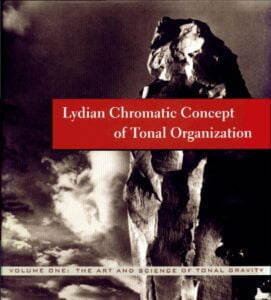 |
Lydian Chromatic Concept of Tonal organization by George Russell Vol One The Art and Science of Tonal gravity |
| Lynyrd Skynyrd The New Best Of Guitar Tablature Recorded Versions 15 greatest hits |
 |
Lynyrd Skynyrd The New Best Of Guitar Tablature |
| Maaya Sakamoto Selection for Piano Solo 1996-2016 |
 |
Maaya Sakamoto Selection for Piano Solo 1996-2016 |
| Macfarren – Scale and Arpeggio Manual | ||
| Mack The Knife (Kurt Weill) G. Shearing ver. |
 |
|
| Mack The Knife (Louis Armstrong) Full score band | Mack The Knife (Louis Armstrong) | |
| Mack The Knife (Musescore File).mscz | ||
| Mack_The_Knife_Louis_Armstrong.mscz | ||
| Madame Jazz Contemporary Women Instrumentalists (Book) |
 |
|
| Mademoiselle Hyde (Lara Fabian) | ||
| Madness Divine Madness Songbook |
 |
|
| Madonna – Beautiful Stranger | ||
| Madonna – Crazy For You | ||
| Madonna – Frozen | Madonna – Frozen | |
| Madonna – Live To Tell | ||
| Madonna – One More Chance | ||
| Madonna – Ray Of Light | ||
| Madonna – Secret | ||
| Madonna – Take A Bow | ||
| Madonna – You Must Love Me | ||
| Madonna – Youll See | ||
| Madonna Confessions On A Dance Floor |
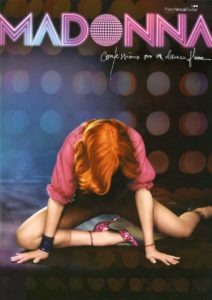 |
Madonna Confessions On A Dance Floor |
| Madonna Like A Virgin Songbook |
 |
Madonna Like A Virgin Songbook |
| Madonna True Blue Songbook |
 |
Madonna True Blue Songbook |
| Madonna, Best of (Very Easy ABC Music for – Madonna) |
 |
Madonna, Best of (Very Easy ABC Music for – Madonna) |
| Maestros Del Clavecin Elena Waiss & Rene Amengual |
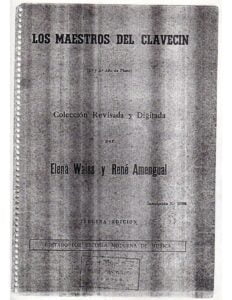 |
Maestros del clavecín |
| Mahalia Jackson I Can Put My Trust In Jesus (Piano) | Mahalia Jackson I Can Put My Trust In Jesus (Piano) | |
| Mahler Adagietto, Piano Transcription By Alexandre Tharaud From Simphony No 5 Piano Solo | Mahler Adagietto, Piano Transcription By Alexandre Tharaud From Simphony No 5 Piano Solo | |
| Mahler Adagietto, Piano Transcription By John Gribben From Simphony No 5 Adagietto Piano Solo | Mahler Adagietto, Piano Transcription By John Gribben From Simphony No 5 Adagietto Piano Solo | |
| Mahler Rückert Lieder (voice and piano) |
 |
|
| Mahler – Symphony No. 5 – Adagietto (Easy Piano Solo arr.) | Mahler – Symphony No. 5 – Adagietto (Easy Piano Solo arr.) | |
| Mahler Adagietto Guitar TABs arr. |
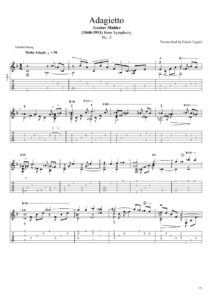 |
|
| Mahler Ich bin der Welt abhanden gekommen from Rückert Lieder piano solo | Mahler Ich bin der Welt abhanden gekommen from Rückert Lieder piano solo | |
| Mahler Ich bin der Welt abhanden gekommen from Rückert Lieder piano solo (Musescore file).mscz | Musescore File | |
| Mahler Lieder nach Texten von Friedrich Ruckert (Voice and full score) | Mahler Lieder nach Texten von Friedrich Ruckert | |
| MAHLER Songs (voix et piano) |
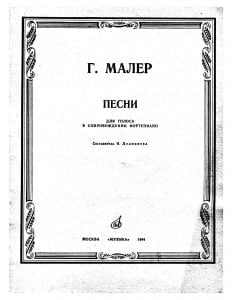 |
|
| Mahler Symphony No. 2 ‘resurrection’ 3rd Movement Piano Solo Arr | Mahler Symphony No. 2 ‘resurrection’ 3rd Movement Piano Solo Arr | |
| Mahler Symphony No. 2 ‘resurrection’ 3rd Movement Piano Solo Arr. (Musescore File).mscz | ||
| Mahler Um Mitternach (voice and piano) |
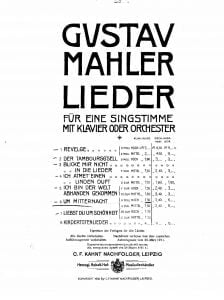 |
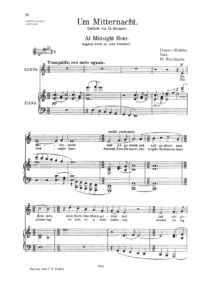 |
| Mahler-Singer – Adagietto from 5th symphony (piano solo) | Mahler-Singer – Adagietto from 5th symphony (piano solo) | |
| Mahler, Gustav – Rückert Lieder – Ich bin der Welt abhanden gekommen (voice and piano) |
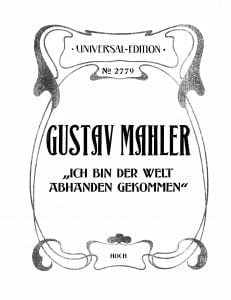 |
 |
| Mahler, Gustav, Kindertotenlieder (voice and piano) Complete |
 |
Mahler, Gustav, Kindertotenlieder (voice and piano) Complete |
| Major and Harmonic minor Scales (Musescore File).mscz | ||
| Makoto Ozone Chopin (Jazz) Waltz No 7 |
 |
|
| Maksim Mrvica – Croatian Rhapsody | ||
| Mal Waldron All Alone Piano Solo transcription |
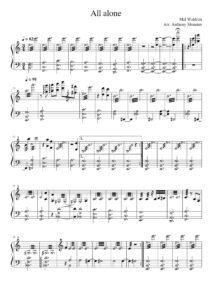 |
|
| Maleficent James Newton Howard Maleficent Music From Disney’s Motion Picture Soundtrack Piano Solo |
 |
Maleficent – James Newton Howard |
| Malena (Ennio Morricone) | ||
| Mama (My Mother) Lara Fabian | ||
| Mama Who Bore Me from Spring Awakening |
 |
|
| Mamas And The Papas – Dream A Little Dream Of Me | ||
| Mamas And The Papas Guitar Songbook Guitar TABs Songbook Edition (The Mamas and The Papas transcribed by Danny Begelman) |
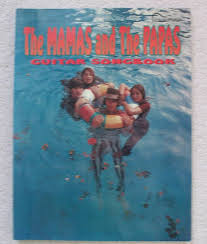 |
Mamas And The Papas Guitar Songbook Guitar TABs Songbook Edition (The Mamas and The Papas transcribed by Danny Begelman) |
| Mamas And The Papas Songbook |
 |
Mamas And The Papas Songbook |
| Mamma Mia The Musical Vocal Selections (ABBA) |
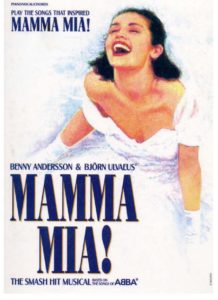 |
Mamma Mia The Musical Vocal Selections |
| Man Of La Mancha (The Musical) Vocal Piano Reduction |
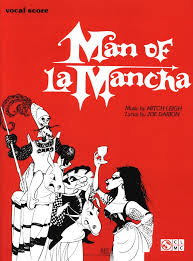 |
Man Of La Mancha (The Musical) Vocal Piano Reduction |
| Mancini – Charade (Musescore File).mscz | ||
| Mancini – The Pink Panther Theme – Easy Piano Solo (Musescore File).mscz | ||
| Mandalorian – Theme | Mandalorian – Theme | |
| Mando Diao – Down In The Past | ||
| Mandy Moore – Cry | ||
| Mandy Moore – Its Gonna Be Love | ||
| Mandy Moore – Only Hope | ||
| Manel Camp Claror (Jazz) | Manel Camp Claror (Jazz) | |
| Manel Camp El Cim alt | ||
| Manel Camp LA DAVALLADA | ||
| Manel Camp La festa de les roses | ||
| Manel Camp LA NIT AQUELLA | ||
| Manel Camp La Pujada | ||
| Manel Camp Mal de muntanya | ||
| Manel Camp Primavera exaltada | ||
| Manel Camp Sol de Murons | ||
| Manfred Schmitz Der Neue Jazz Parnass |
 |
Manfred Schmitz Der Neue Jazz Parnass 1 |
| Manfred Schmitz Blues And Boogie Woogie |
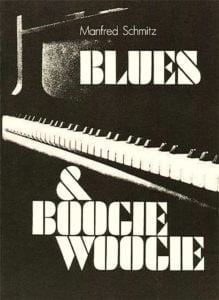 |
Manfred Schmitz Blues And Boogie Woogie |
| MANGO Successi | MANGO Successi | |
| Manha de Carnaval (Black Orpheus) by Luis Bonfa | Manha-de-Carnaval Black Orpheus | |
| Manha de Carnaval (Black Orpheus) Guitar Luis Bonfa (as played by Baden Powell) |
 |
|
| Manha De Carnaval (Musescore File).mscz | ||
| Manhattan (Musescore File).mscz | ||
| Manhattan by Rodgers & Hart | MANHATTAN | |
| MANHATTAN Hart & Rodgers (lead sheet) |
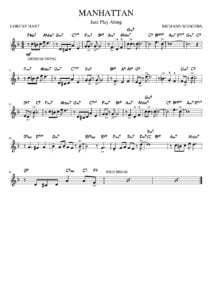 |
|
| Mannheim Steamroller Christmas Extraordinaire Piano Solo |
 |
Mannheim Steamroller Christmas Extraordinaire Piano Solo |
| Mansell Clint Requiem for a Dream | ||
| Mantras Guitar songbook |
 |
Mantras Guitar songbook |
| Manu Chao – Clandestino (Easy Piano Solo arr.) |
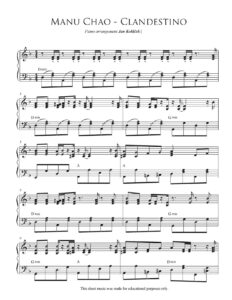 |
|
| Manual of Scales Arpeggios & Broken Chords for Pianoforte by Oscar Beringer |
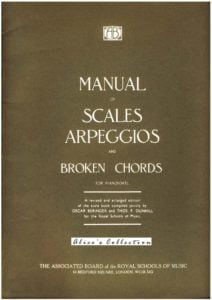 |
|
| Manuale Pratico Di Jazz Per Pianoforte (in Italian) |
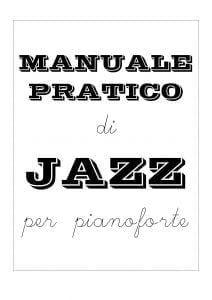 |
|
| Manuel Ayala Lozano Metodo Completo De Guitarra (Todos Los Niveles) |
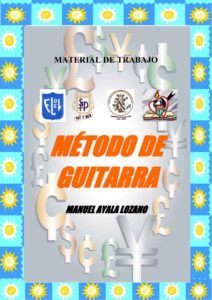 |
|
| Manuel Blancafort – Cançó Per Adormir – Canción Para Dormir (Guitar, Guitarra) |
 |
|
| Manuel Quiroga – Llora La Guitarra Arr. Carles Trepat (Sheet Music) | Manuel Quiroga – Llora La Guitarra Arr. Carles Trepat (Sheet Music) | |
| Maplestory The Lake Of Oblivion Road Of Vanishing by NECORD (ASTERIA) Game Piano solo |
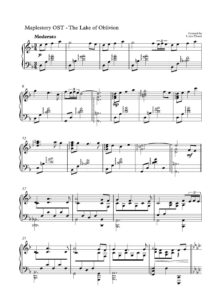 |
|
| Marc Anthony Songbook |
 |
Marc Anthony Marc Anthony Songbook |
| Marc Cohn Walking in Memphis (sheet music ) | walking-in-memphis_marc-cohn_sheet-music | |
| Marc Schonbrun – Everything Rock and Blues Guitar Book |
 |
|
| Marcel Mule Pieces Celebres Soprano saxophon Bb and Piano |
 |
Marcel Mule Pieces Celebres Soprano saxophon Bb and Piano |
| Marche Des Rois Easy Piano (Musescore File).mscz | ||
| Marchetti – Fascination from the movie Love in the afternoon Piano Solo |
 |
|
| Marco Beltrami Rosemary’s Theme (From The Film The Giver) Piano Solo |
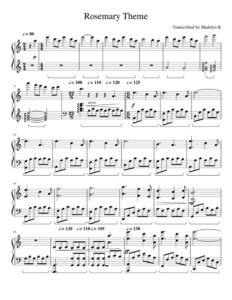 |
|
| Marco Borsato – Vaderdag | ||
| Marco Di Battista – Lezioni Di Pianoforte Jazz (Italian) | Book Theory | |
| Marco Frisina O Ostia santa (for organ and soloist) | ||
| Marcus Miller, Best of Marcus Liller Bass Recorded Versions |
 |
Marcus Miller, Best of Marcus Liller Bass Recorded Versions |
| Marcus Roberts – Single Petal Of A Rose (by Duke Ellington) | Marcus Roberts – Single Petal Of A Rose (by Duke Ellington) | |
| Marcus Roberts – Solo On Autumn Leaves | Marcus Roberts – Solo On Autumn Leaves | |
| Maren Morris Sheet Music Collection Piano Vocal Guitar |
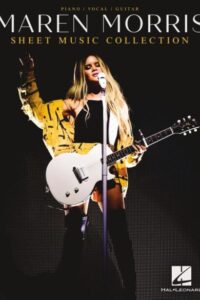 |
Maren Morris Sheet Music Collection Piano Vocal Guitar |
| Margherita (Riccardo Cocciante) | ||
| Maria Linnemann My Beautiful Country (Guitar) |
 |
Maria Linnemann My Beautiful Country (Guitar) |
| Maria Schneider Hang Gliding | Maria Schneider Hang Gliding | |
| Maria Schneider Ladybird By Tadd Dameron Jazz Giants Series | Maria Schneider Ladybird By Tadd Dameron Jazz Giants Series | |
| Maria Schneider The Pretty Road (Transposed Score) | Maria Schneider The Pretty Road (Transposed Score) | |
| Mariage d’amour – Spring Waltz by Paul de Senneville (partition, sheet music, Noten).mscz | ||
| Mariage D’amour sheet music download partitions gratuites Noten spartiti partituras (Musescore File).mscz | ||
| Mariah Carey – The Meaning of Mariah Carey (Book) |
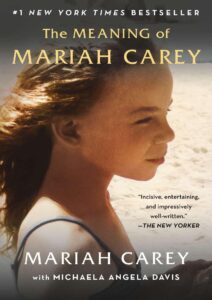 |
|
| Mariah Carey – All I Want For Christmas Is You (Piano Solo) |
 |
|
| Mariah Carey – Always Be My Baby | ||
| Mariah Carey – Anytime You Need A Friend | ||
| Mariah Carey – Hero | ||
| Mariah Carey – Love Takes Time | ||
| Mariah Carey – One Sweet Day | ||
| Mariah Carey – Through The Rain | ||
| Mariah Carey – Without You | ||
| Mariah Carey 1s Piano Vocal guitar |
 |
Mariah Carey 1s Piano Vocal guitar contents |
| Mariah Carey Anthology Piano Vocal Guitar |
 |
Mariah Carey Anthology Piano Vocal Guitar |
| Mariah Carey Emotions Songbook |
 |

 |
| Mariah Carey Mariah Carey Songbook Piano Vocal guitar songbook |
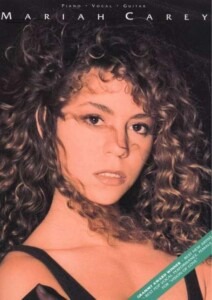 |
Mariah Carey Mariah Carey Songbook Piano Vocal guitar contents |
| Mariah Carey Merry Christmas |
 |
Mariah Carey Merry Christmas |
| Mariah Carey The Ballads Piano Vocal Guitar |
 |
Mariah Carey The Ballads Piano Vocal Guitar |
| Marilyn Manson Holy Wood |
 |
Marilyn Manson Holy Wood |
| Marilyn Monroe Songbook |
 |
Marilyn Monroe – Songbook (39pp) |
| Mark Fowler Interstellar Piano Suite |
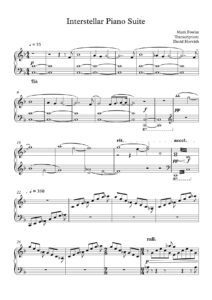 |
|
| Mark Harrison – Contemporary Jazz Piano |
 |
Contemporary Jazz Piano |
| Mark Harrison – Intro to Jazz Piano |
 |
|
| Mark Harrison – Smooth Jazz piano (PDF + MP3 audio tracks) |
 |
Mark Harrison.-Smooth Jazz Piano |
| Mark Harrison Beginning Rock Keyboard (PDF + MP3 audio tracks) |
 |
Mark Harrison – Beginning Rock Keyboard Contents |
| Mark Harrison Blues Piano (PDF + MP3 audio tracks) |
 |
Mark Harrison – Blues Piano Contents |
| Mark Harrison Contemporary Music Theory Level One A Complete Harmony And Theory Method For The Pop And Jazz Musician |
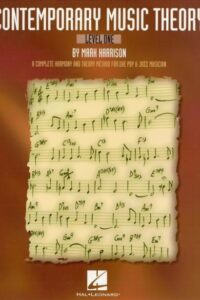 |
|
| Mark Harrison Country Piano (PDF + MP3 audio tracks) The Complete Guide Keyboard Style series |
 |
Mark Harrison – Country Piano Contents |
| Mark Harrison Funk Keyboard For Beginners |
 |
|
| Mark Harrison Jazz Blues Piano (PDF + MP3 audio tracks) |
 |
Mark Harrison – Jazz-Blues Piano Contents |
| Mark Harrison R&B Keyboard (complete guide with audio MP3) Rhythm and blues R’n’B |
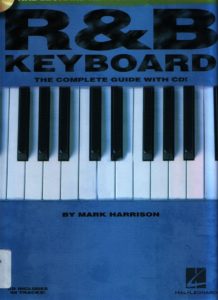 |
Mark Harrison – R&B Keyboard |
| Mark Hayes Hymn Settings That Touch The Soul |
 |
Mark Hayes Hymns That Touch The Soul |
| Mark Hayes Piano For All Times arr. for special occasions |
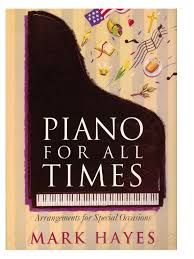 |
Mark Hayes Piano For All Times arr. for special occasions |
| Mark Hayes The Best Of |
 |
Mark Hayes The Best Of |
| Mark Isham – When Things Dream |
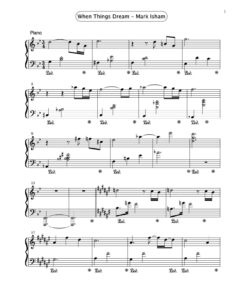 |
|
| Mark Isham Building A Family |
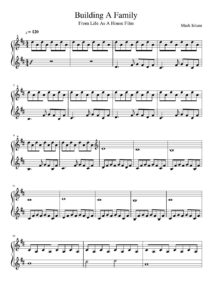 |
|
| Mark Isham The Evil Queen Theme |
 |
|
| Mark Knopfler – Telegraph Road (piano & vocal sheet music) |
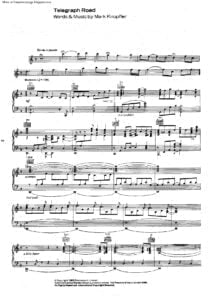 |
|
| Mark Knopfler Get Lucky Songbook (Guitar with Tablature) |
 |
Mark Knopfler Get Lucky Guitar TABs — 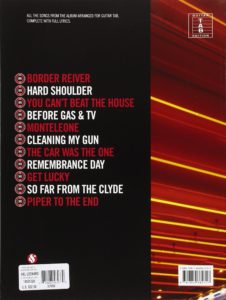 |

